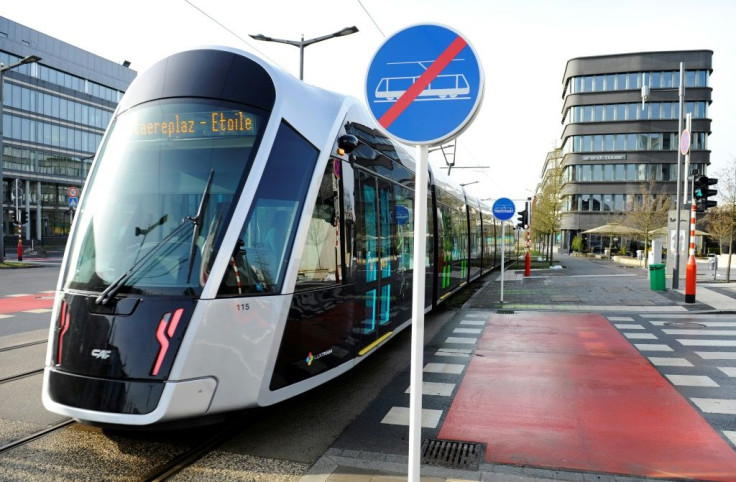Luxembourg Becomes First Nation In The World To Make Public Transport Free

KEY POINTS
- Luxembourg eliminated fares for all trains, trams and buses
- Most of the 214,000 foreigners who commute daily to Luxembourg drive cars
- In the EU, Luxembourg has the highest rate of cars per 1,000 people
Tiny Luxembourg became the first country in the world to make its public transport completely free in an attempt to reduce traffic congestion and help low income residents.
On Saturday, Luxembourg eliminated fares for all trains, trams and buses – for residents, commuters and tourists alike.
“For people with low incomes or [earning] the minimum wage, for them it’s really substantial,” said transport minister Francois Bausch. “The main reason is to have a better quality of mobility, and then the [other] reason is clearly also environmental issues.”
One-way fares on trains and buses used to cost 2 euros ($2.23).
An annual pass for all standard-class journeys on public transport once cost 440 euros ($489).
However, first-class railway transport will not be free – these tickets can be purchased for 660 euros ($735) a year.
"The government wants Luxembourg to become a laboratory for mobility," said Bausch, who cited that Luxembourg’s population has surged 40% in 20 years.
Bausch, member of the Greens, also serves as Luxembourg's deputy prime minister in a three-party coalition government led by premier Xavier Bettel.
Public transport in Luxembourg will now be funded largely through taxes paid into the national budget.
The cost of the project will amount to €41m ($45.6 million) in lost ticket fares – however Luxembourg has an annual transport budget of 500 million euros ($557 million).
"Of course, just because I call it free transport doesn't mean nobody pays," said Bausch.
The free ticket measure will not lead to any job cuts.
Luxembourg, which is the wealthiest nation in Europe based on gross domestic product per capita, has a population of only 614,000. However, an additional 214,000 people commute daily into the state (mostly by car) from Germany, Belgium and France, resulting in heavy traffic jams. The commuters account for almost half of Luxembourg’s workforce, attracted to the grand duchy by its high salaries.
In the EU, Luxembourg has the highest rate of cars per 1,000 people – 750 as of 2017, followed by Cyprus (739) and Italy (721). More than 50% of Luxembourg’s greenhouse gas emissions come from transport.
Currently, buses are only used by 32% of commuters and trains, only 19%. By comparison, 69% of Parisian workers use public transport.
Paul Kirby of BBC wrote: “Luxembourg has a terrible traffic problem. Major roads are snarled up in the rush-hour, buses are old-fashioned and the rail system is notorious for its delays. Diesel and petrol costs are cheap in Luxembourg, compared with its neighbors, so not only do many commuters from neighboring countries drive to work. but ‘fuel tourists’ cross the border to fill their tanks.”
Some other cities in Europe – including Tallinn, the Estonian capital, Dunkirk, France and Hasselt, in Belgium -- have also abolished public transport fees, but Luxembourg is the first nation to do so.
Luxembourg also plans to spend 3.9 billion euros [$4.3 billion] on railways and upgrade its bus network to meet an anticipated 20% rise in public mobility needs by 2025.
However, despite these investments, the Luxembourg government still expects 65% of its commuters to drive to work by car in 2025, down from 73% in 2017.
Markus Hesse, professor of urban studies at the University of Luxembourg, criticized the measure, citing that since the duchy pays high salaries and has low fuel prices, most people will still prefer the comfort and convenience of cars.
Hesse also said the government chose the wrong time to make public transport free since the tram system’s expansion is not even finished yet.
"They're investing so much that while the total [public transport] system is being overhauled the delays are actually increasing, because they are working on tracks trying to fix it," he said.
Blanche Weber, president of Luxembourg's Ecological Movement, said: "We have invested for years in the construction of roads. The government is making efforts, but there is a huge delay in terms of the development of public transport."
Some critics charge the free public transport does nothing to alleviate a chronic housing shortage.
Habitat Observatory reported that housing costs increased by 10%-12% in 2018 alone and that many households spend more than half of their income on apartment rentals.
Luxembourg's statistics service Statec reported that real estate prices have been climbing by almost 5.4% per year since 2011.
Statec also estimated that last year 24% of the population was at risk of poverty, up from 15.4% in 2017.
© Copyright IBTimes 2024. All rights reserved.





















